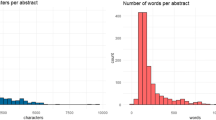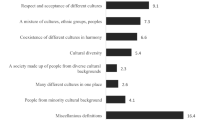Abstract
The question of how society should deal with social conflicts arising from cultural differences persists. Should we adopt an exclusivist approach by excluding reasons based on specific cultural traditions (culture-based reasons) from public debates about social policy, especially because these reasons do not appeal to the public at large? Or should we resort to an inclusivist approach by including reasons based on cultural traditions in public debate to give recognition to the diverse cultural identities of those who practice these traditions? While these two approaches assign different roles to cultural traditions in public debate, both seem to welcome compromise between conflicting parties. This paper reviews contending normative approaches for dealing with conflicts in multicultural societies and explores the place of culture-based reasons in public debates designed to resolve conflicts.
Similar content being viewed by others
References
Alvarez, A.A.A. (2009). The preintrinsic value of vital needs and the problem of extreme scarcity. Asian Bioethics Review, 1, 198–217.
Ackerman, B.A., & Fishkin, J.S. (2004). Deliberation day. New Haven, Conn.: Yale University Press.
Addis, A. (1997). Human diversity and the limits of toleration. In J. Shapiro & W. Kymlicka (Eds.), Ethnicity and group rights (pp. 112–153). New York: New York University Press.
Alesina, A., & Drazen, A. (1991). Why are stabilizations delayed? American Economic Review, 81, 1170–1188.
Baldwin, J. R. et al. (2006). A moving target: The illusive definition of culture. In J.R. Baldwin et al. (Eds.), Redefining culture: Perspectives across the disciplines (pp. 3–26). Mahwah, NJ: Lawrence Erlbaum.
Bohman, J. (1995). Public reason and cultural pluralism: Political liberalism and the problem of moral conflict. Political Theory, 23, 253–279.
Chambers, S. (2004). Behind closed doors: Publicity, secrecy, and the quality of deliberation. Journal of Political Philosophy, 12(4), 389–410.
Daniels, N., & Sabin, J. (2002). Setting limits fairly: Can we learn to share medical resources? Oxford, UK: Oxford University Press.
Denker, H.-W. (2006). Potentiality of embryonic stem cells: an ethical problem even with alternative stem cell sources. Journal of Medical Ethics, 32, 665–671.
Dryzek, J. (2000). Difference democracy. In J. Dryzek. Deliberative democracy and beyond (pp. 57–80). Oxford: Oxford University Press.
Dryzek, J. (2005). Making sense of earth’s politics. In J. Dryzek. The politics of the earth: Environmental discourses (pp. 1–23). Oxford: Oxford University Press.
Easterly, W. (2001). Can institutions resolve ethnic conflict? Economic Development and Cultural Change, 49, 687–706.
Easterly, W., & Levine, R. (1997). Africa’s growth tragedy: Policies and ethnic divisions. Quarterly Journal of Economics, 112, 1203–1250.
Espinoza, N., & Peterson, M. (2012). How to depolarise the ethical debate over human embryonic stem cell research (and other ethical debates too!). Journal of Medical Ethics, 38, 496–500.
Friedman, A. (2008). Beyond accountability for reasonableness. Bioethics, 22, 101–112.
Feinberg, J. (1986). Harm to self. The moral limits of the criminal law. New York: Oxford University Press.
Fishkin, J.S. (1991). Democracy and deliberation: new directions for democratic reform. New Haven, Conn.: Yale University Press.
Fishkin, J. S. (1997). The voice of the people: Public opinion and democracy. New Haven: Yale University Press.
Fishkin, J. S., & Luskin, R. C. (2005). Experimenting with a democratic ideal: Deliberative polling and public opinion. Acta Politica, 4, 284–298.
Habermas, J. (1994). Struggles for recognition in the democratic constitutional state. In C. Taylor et al. Multiculturalism: Examining the politics of recognition (pp. 107–148). Princeton: Princeton University Press.
Kroeber, A.L. et al. (1952). Culture: A critical review of concepts and definitions. Cambridge, Mass.: The Museum.
Kymlicka, W. (1995). Multicultural citizenship: A liberal theory of minority rights. Oxford: Clarendon Press.
Okin, S. (1999). Is multiculturalism bad for women? In J. Cohen et al. (Eds.), Is multiculturalism bad for women? (pp. 9–24). Princeton: Princeton University Press.
Rawls, J. (1971). A theory of justice. Cambridge, Mass.: The Belknap Press of Harvard University Press.
Rawls, J. (1999). A theory of justice. Oxford: Oxford University Press.
Rawls, J. (1985). Justice as fairness: Political not metaphysical. Philosophy & Public Affairs, 14, 223–251.
Rawls, J. (1987). The idea of an overlapping consensus. Oxford Journal of Legal Studies 7, 1–25.
Rawls, J. (1993). Political liberalism. New York: Columbia University Press.
Salter, B., & Salter, C. (2007). Bioethics and the global moral economy: The cultural politics of human embryonic stem cell science. Science, Technology & Human Values, 32, 554–581.
Taylor, C. (1994). The politics of recognition. In A. Gutman (Ed.). Multiculturalism: Examining the politics of recognition (pp. 25–73). Princeton: Princeton University Press.
Thorseth, M. (1999). Legitimate and illegitimate paternalism in polyethnic conflicts. Gothenburg, Sweden: Department of Philosophy, University of Gothenburg.
Thorseth, M. (2001). Multicultural conflicts — between autonomy and paternalism. Migration. A European Journal of International Migration and Ethnic Relations, 39/40/41, 5–26.
Thorseth, M. (2009). The ethics of global communication online. In R. Luppicini & R. Adell (Eds.), Handbook of research on technoethics (pp. 278–293). Hershey, PA: IGI Global.
Thorseth, M. (2011). Global communication online against fundamentalist knowledge offline? In U. Mårtensson et al. (Eds.), Fundamentalism in the modern world. Vol 2: Fundamentalism and communication: culture, media and the public sphere (pp. 25–48). New York: Tauris Parke.
Young, I.M. (2002). Inclusion and democracy. Oxford: Oxford University Press.
Author information
Authors and Affiliations
Corresponding author
Additional information
Research for this paper was supported by the Globalization Research Programme of the Norwegian University of Science and Technology and the project “Applied Ethics: Technology and Governance of Health and Natural Resources” funded by the Research Council of Norway (217426). I am grateful to Peter Danielson, Michael McDonald, David Silver, and Michael MacKenzie for their suggestions and comments to an earlier version of the paper presented at the W. Maurice Young Centre for Applied Ethics, University of British Columbia. I also thank two anonymous reviewers for their critical comments which helped to further clarify key points. Any remaining errors, however, are mine.
About this article
Cite this article
Alvarez, A.A. The place of culture-based reasons in public debates. Humaff 24, 232–247 (2014). https://doi.org/10.2478/s13374-014-0222-0
Published:
Issue Date:
DOI: https://doi.org/10.2478/s13374-014-0222-0




